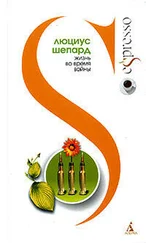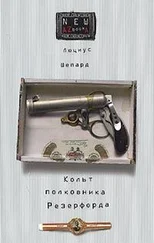I think I had been expecting something bloody and ghoulish, or perhaps a gauzy insubstantial form; but he looked no different than he had on the day he died. Haggard; wearing sweat-stained fatigues; his face half-obscured by a week’s growth of stubble. On his helmet were painted the words Didi Mao (“Fuck Off” in Vietnamese), and I could make out the yellowing photograph of his girl that he’d taped to his rifle stock. He didn’t act startled by our presence; on the contrary, his attitude was nonchalant. He shouldered his rifle, tipped back his helmet, and sauntered toward us. He seemed to be recessed into the backdrop: it was as if reality were two-dimensional and he was a cutout held behind it to give the illusion of depth. At least that’s how it was one moment. The next, he would appear to be set forward of the backdrop like a popup figure in a fancy greeting card. Watching him shift between these modes was unsettling…more than unsettling. My heart hammered, my mouth was cottony. I bumped into someone and realized that I had been backing away, that I was making a scratchy noise deep in my throat. Stoner’s eyes, those eyes that had looked dead even in life, pupils about .45 caliber and hardly any iris showing, they were locked onto mine and the pressure of his stare was like two black bolts punching through into my skull.
“Puleo,” he said.
I couldn’t hear him, but I saw his lips shape the name. With a mixture of longing and hopelessness harrowing his features, he kept on repeating it. And then I noticed something else. The closer he drew to me, the more in focus he became. It wasn’t just a matter of the shortening distance; his stubble and sweat stains, the frays in his fatigues, his worry lines—all these were sharpening the way details become fixed in a developing photograph. But none of that disturbed me half as much as did the fact of a dead man calling my name. I couldn’t handle that. I began to hyperventilate, to get dizzy, and I believe I might have blacked out; but before that could happen, Stoner reached the edge of the fields, the barrier beyond which he could not pass.
Had I had more mental distance from the event, I might have enjoyed the sound-and-light that ensued: it was spectacular. The instant Stoner hit the end of his tether, there was an earsplitting shriek of the kind metal emits under immense stress; it seemed to issue from the air, the trees, the earth, as if some ironclad physical constant had been breached. Stoner was frozen midstep, his mouth open, and opaque lightnings were forking away from him, taking on a violet tinge as they vanished, their passage illuminating the curvature of the fields. I heard a scream and assumed it must be Stoner. But somebody grabbed me, shook me, and I understood that I was the one screaming, screaming with throat-tearing abandon because his eyes were boring into me and I could have sworn that his thoughts, his sensations, were flowing to me along the track of his vision. I knew what he was feeling: not pain, not desperation, but emptiness. An emptiness made unbearable by his proximity to life, to fullness. It was the worst thing I’d ever felt, worse than grief and bullet wounds, and it had to be worse than dying—dying, you see, had an end, whereas this went on and on, and every time you thought you had adapted to it, it grew worse yet. I wanted it to stop. That was all I wanted. Ever. Just for it to stop.
Then, with the same abruptness that he had appeared, Stoner winked out of existence and the feeling of emptiness faded.
People pressed in, asking questions. I shouldered them aside and walked off a few paces. My hands were shaking, my eyes weepy. I stared at the ground. It looked blurred, an undifferentiated smear of green with a brown clot in the middle: this gradually resolved into grass and my left shoe. Ants were crawling over the laces, poking their heads into the eyelets. The sight was strengthening, a reassurance of the ordinary.
“Hey, man.” Witcover hove up beside me. “You okay?” He rested a hand on my shoulder. I kept my eyes on the ants, saying nothing. If it had been anyone else, I might have responded to his solicitude; but I knew he was only sucking up to me, hoping to score some human interest for his satellite report. I glanced at him. He was wearing a pair of mirrored sunglasses, and that consolidated my anger. Why is it, I ask you, that every measly little wimp in the universe thinks he can put on a pair of mirrored sunglasses and instantly acquire magical hipness and cool, rather than—as is the case—looking like an asshole with reflecting eyes?
“Fuck off,” I told him in a tone that implied dire consequences were I not humored. He started to talk back, but thought better of it and stalked off. I returned to watching the ants; they were caravanning up inside my trousers and onto my calf. I would become a legend among them: The Human Who Stood Still for Biting.
From behind me came the sound of peremptory gook voices, angry American voices. I paid them no heed, content with my insect pals and the comforting state of thoughtlessness that watching them induced. A minute or so later, someone else moved up beside me and stood without speaking. I recognized Tuu’s cologne and looked up. “Mr. Puleo,” he said. “I’d like to offer you an exclusive on this story.” Over his shoulder, I saw my colleagues staring at us through the windows of the bus, as wistful and forlorn as kids who have been denied Disneyland: they, like me, knew that big bucks were to be had from exploiting Stoner’s plight.
“Why?” I asked.
“We want your help in conducting an experiment.”
I waited for him to continue.
“Did you notice,” he said, “that after Stoner identified you, his image grew sharper?”
I nodded.
“We’re interested in observing the two of you in close proximity. His reaction to you was unique.”
“You mean go in there?” I pointed to the village. “You said it was dangerous.”
“Other subjects have entered the fields and shown no ill effects. But Stoner was not as intrigued by them as he was with you.” Tuu brushed a lock of hair back from his forehead. “We have no idea of Stoner’s capabilities, Mr. Puleo. It is a risk. But since you served in the Army, I assume you are accustomed to risk.”
I let him try to persuade me—the longer I held out, the stronger my bargaining position—but I had already decided to accept the offer. Though I wasn’t eager to feel that emptiness again, I had convinced myself that it had been a product of nerves and an overactive imagination; now that I had confronted Stoner, I believed I would be able to control my reactions. Tim said that he would have the others driven back to Saigon, but I balked at that. I was not sufficiently secure to savor the prospect of being alone among the gooks, and I told Tuu I wanted Fierman and Witcover to stay. Why Witcover? At the time I might have said it was because he and Fierman were the only two of my colleagues whom I knew; but in retrospect, I think I may have anticipated the need for a whipping boy.
* * *
We were quartered in a house at the eastern edge of the village, one that the fields did not enclose. Three cots were set up inside, along with a table and chairs; the yellow walls were brocaded with mildew, and weeds grew sideways from chinks in the concrete blocks. Light was provided by an oil lamp that—as darkness fell—sent an inconstant glow lapping over the walls, making it appear that the room was filled with dirty orange water.
After dinner Fierman produced a bottle of whiskey—his briefcase contained three more—and a deck of cards, and we sat down to while away the evening. The one game we all knew was Hearts, and we each played according to the dictates of our personalities. Fierman became quickly drunk and attempted to Shoot the Moon on every hand, no matter how bad his cards; he seemed to be asking fate to pity a fool. I paid little attention to the game, my ears tuned to the night sounds, half expecting to hear the sputter of small-arms fire, the rumor of some ghostly engagement; it was by dint of luck alone that I maintained second place. Witcover played conservatively, building his score through our mistakes, and though we were only betting a nickel a point, to watch him sweat out every trick you would have thought a fortune hung in the balance; he chortled over our pitiful fuckups, rolling his eyes and shaking his head in delight, and whistled as he totaled up his winnings. The self-importance he derived from winning fouled the atmosphere, and the room acquired the stateness of a cell where we had been incarcerated for years. Finally, after a particularly childish display of glee, I pushed back my chair and stood.
Читать дальше






